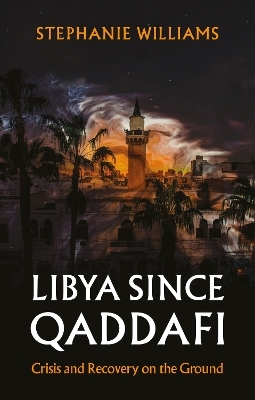
Libya Since Qaddafi
Crisis and Recovery on the Ground
Seiten
2025
C Hurst & Co Publishers Ltd (Verlag)
978-1-911723-80-6 (ISBN)
C Hurst & Co Publishers Ltd (Verlag)
978-1-911723-80-6 (ISBN)
- Noch nicht erschienen (ca. April 2025)
- Versandkostenfrei
- Auch auf Rechnung
- Artikel merken
An inside account of conflict, collapse and innovative approaches to reconstruction in Libya’s challenging post-2011 landscape.
Drawing on her experience as a United Nations mediator and a senior American diplomat, Stephanie Williams provides a first-hand examination of post-Qaddafi Libya. Using concrete examples from her experience in the country, Williams analyses the underlying drivers of the Libyan conflict, as well as the motivations of the international actors and the various Libyan protagonists. She bears witness to the horrific effect of General Haftar’s attack on Tripoli in 2019, how it tore apart a UN peace process, and how she worked alongside UN envoy Ghassan Salamé to reassemble some semblance of an international consensus under the Berlin Process and accompanying intra-Libyan tracks: military, economic and political.
Williams recounts her leadership of the UN mediation during the Covid pandemic, adopting new technologies and blending hybrid and physical meetings to produce the October 2020 ceasefire agreement, as well as progress on the economic track and an inclusive political agreement. She also lays out the pernicious effect of new media on peacemaking, and how disinformation and hate speech have exacerbated Libya’s fragmentation. Finally, Williams offers ideas on how to break Libya’s cycle of division and dysfunction to meet the longstanding aspirations of the people to live in peace and dignity.
Drawing on her experience as a United Nations mediator and a senior American diplomat, Stephanie Williams provides a first-hand examination of post-Qaddafi Libya. Using concrete examples from her experience in the country, Williams analyses the underlying drivers of the Libyan conflict, as well as the motivations of the international actors and the various Libyan protagonists. She bears witness to the horrific effect of General Haftar’s attack on Tripoli in 2019, how it tore apart a UN peace process, and how she worked alongside UN envoy Ghassan Salamé to reassemble some semblance of an international consensus under the Berlin Process and accompanying intra-Libyan tracks: military, economic and political.
Williams recounts her leadership of the UN mediation during the Covid pandemic, adopting new technologies and blending hybrid and physical meetings to produce the October 2020 ceasefire agreement, as well as progress on the economic track and an inclusive political agreement. She also lays out the pernicious effect of new media on peacemaking, and how disinformation and hate speech have exacerbated Libya’s fragmentation. Finally, Williams offers ideas on how to break Libya’s cycle of division and dysfunction to meet the longstanding aspirations of the people to live in peace and dignity.
Stephanie Williams is an experienced international mediator serving with the UN in Libya, where she produced a nation-wide ceasefire agreement and a political agreement, using hybrid technologies to build a more inclusive process. A former US diplomat, Williams has an extensive background in the Middle East and North Africa region.
| Erscheint lt. Verlag | 3.4.2025 |
|---|---|
| Verlagsort | London |
| Sprache | englisch |
| Maße | 138 x 216 mm |
| Themenwelt | Geisteswissenschaften ► Geschichte ► Regional- / Ländergeschichte |
| Sozialwissenschaften ► Politik / Verwaltung ► Europäische / Internationale Politik | |
| ISBN-10 | 1-911723-80-4 / 1911723804 |
| ISBN-13 | 978-1-911723-80-6 / 9781911723806 |
| Zustand | Neuware |
| Haben Sie eine Frage zum Produkt? |
Mehr entdecken
aus dem Bereich
aus dem Bereich
Erinnerungen
Buch | Softcover (2024)
Pantheon (Verlag)
CHF 22,40
Universalgelehrter, Polarreisender, Entdecker
Buch | Hardcover (2024)
mareverlag
CHF 39,20


